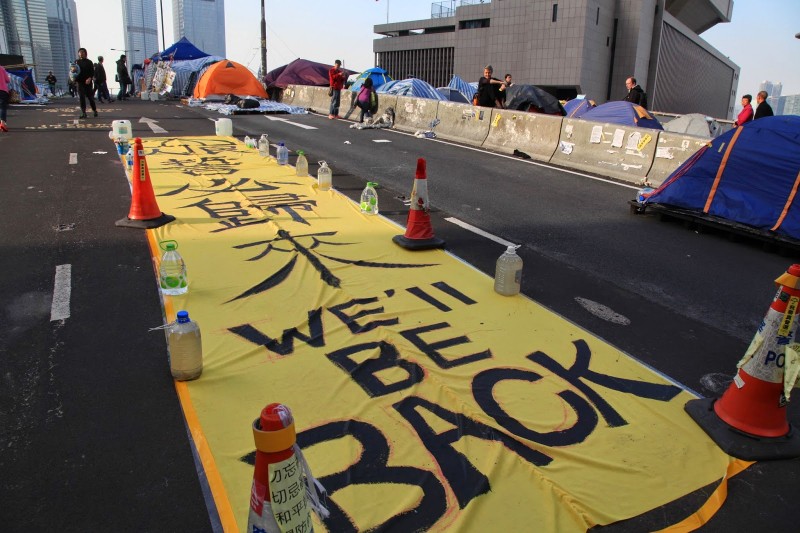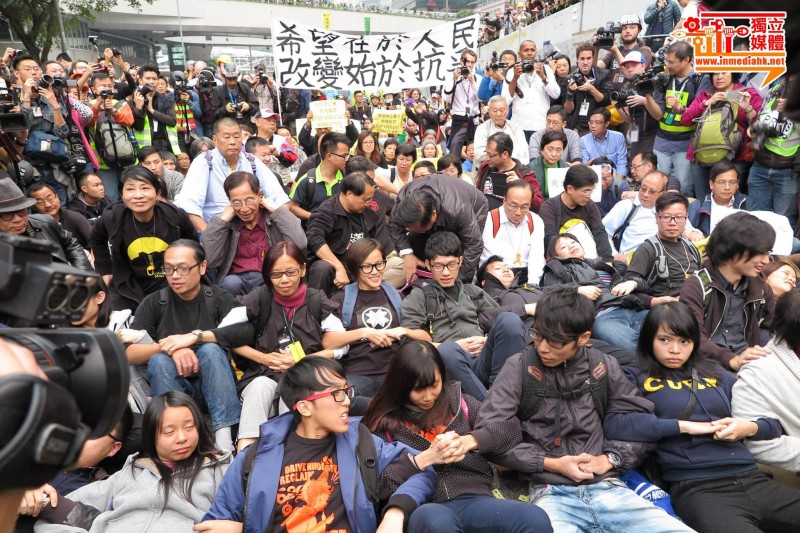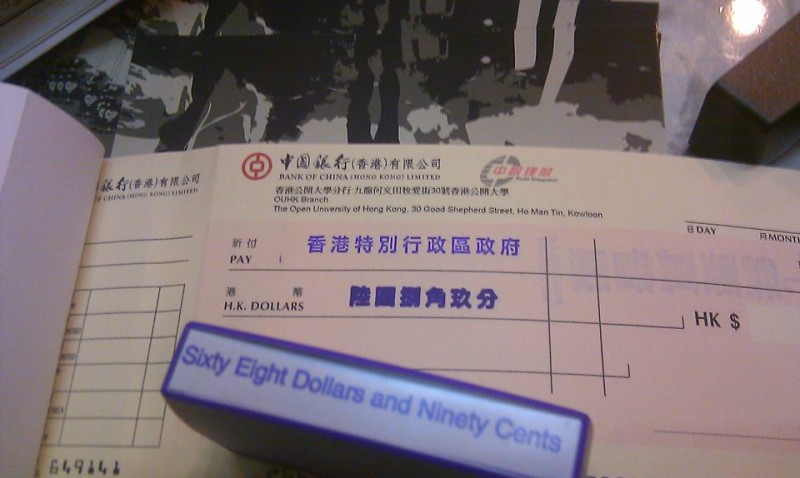
There were more than 100 “We'll be back” banners hanging at the Admiralty protest site before then police clearance on December 11, blogger Au Ka Lun observes. Photo taken by Au Ka Lun, non-commercial use.
As the Hong Kong police removed the last scrap of tarp from the site of the 75-day massive sit-in protest at Admiralty, protesters vowed, “We'll be back!”
More than 200 protesters were arrested on December 11, 2014, after they refused to move from the last of the site. Among the arrested were students, pro-democracy lawmakers, university professors and pop stars.
Since September 28, protesters have been camping out in Hong Kong's financial district Admiralty, demanding that Beijing withdraw the framework it has imposed on the election of Hong Kong's top leader the chief executive.
Beijing had promised Hong Kong, a special administrative region of China, a direct vote for the first time in the 2017. But then suddenly introduced this framework, which defeats the purpose, because it requires potential candidates to get majority support from a nominating committee stacked with pro-Beijing (and pro-Chinese Communist Party) members.

- More than 200 pro-democracy protesters were arrested during the police clearance at Admiralty on December 11. Photo from inmediahk.net
At Occupy Central, protesters faced violent attacks from thugs and aggressive police fearlessly, and they started to see that they had to leave the streets and develop other battlefields to push for genuine democratic reform in Hong Kong.
So where's the new battlefield? In these five new strategies:
1. Symbolic resistance
The most spontaneous reaction to the police clearance has been the Shopping Revolution, a move to peacefully reclaim the protest site and to tell the ruling elites that the political problem is yet to be resolved by window shopping at Mong Kok district.
Similar symbolic resistances can be seen in the yellow banners demanding democracy hanging in school campuses, yellow ribbons worn by pro-democracy citizens’ as part of their daily accessories and yellow umbrellas stretching open at all sort of occasions where government officials are invited.
2. Civic disobedience
Pro-democracy citizens are using Facebook to coordinate a long term civic disobedience movement. At least two Facebook pages are devoted to tax disobedience. “10 dollar less tax” urges tax payers to pay 10 dollar less tax money as a gesture of their discontent and “Break down tax bill into 689” urges tax payers to break their tax bill into multiple checks of HKD 6.89 or HKD 68.9 or HKD 689 to increase the workload of tax department. The number 689 represents the current chief executive, Leung Chun Ying, who only managed to obtain 689 votes out of the 1200-member election committee.
3. Grassroots elections
The street occupation created traffic jams and affected ordinary people's daily life, which the pro-Beijing groups used, through their signature campaigns, to successfully generated public resentment towards pro-democracy protesters. Since mid- October, a number of civic groups and student activist groups have started disseminating pamphlets to grassroots communities to win back their supports.
In addition, some netizens have started planning to run for 2015 grassroots election in districts where the pro-establishment candidates have no competitors.
“Two spoons of sugar in tea” opened a discussion thread in Golden Forum, the most popular online forum in Hong Kong, in early November and the message went viral on social media:
現時有76個區議會席位係自動當選。
高登仔如果全面去自動當選地區參選,縱然贏唔到,都可以極大牽制保皇黨係其他地區既部署。
係選舉既過程中又可以深入自市民解釋香港政制既問題。
甚至一個唔覺意當選,都係一份OK 既工。。。 
滿21歲,有10個選民提名就可以參加,按金$3000, 有多過5% 票就可以拎番按金。每個區既人數只係5000-8000 左右,以投票率四成計,最多160票就可以拎番按金,一個區怕有百幾個高登巴絲卦。
Currently there are 70 districts where candidates have the seats without competition.
If Golden netizens participated in those districts, even if we could not win the seat, we could disrupted the pro-establishment groups’ election campaign.
We can make use of the election process to help people understand what's wrong with our political system.
If by accident, you win the election, that would be an OK job…
Anyone who reaches 21-year old, all you need is 10 legitimate voters to nominate you and the election deposit is just HK$ 3,000 dollars [equivalent to US$ 400 dollars]. If you manage to get 5% of the total votes, you can get back the deposit. There are about 5000 to 8000 voters in one district, usually the voting rate is 40%, which means all you need is 160 votes and you can get back the deposit. I think we have enough forum friends in each district [to get the 5% vote].
4. Monitoring police violence
There have been many reports about the police's use of excessive forces against protesters. In addition to the preexisting human rights organizations, a number of new civic organizations and citizen initiated projects have been launched to monitor police violence and abusive behavior.
Hong Kong Shield, an organization of university professors and artists, including pop stars, was established in October to monitor police use of force and call for an independent inspection body to investigate reports against police. It was stationed at the Admiralty protest site and had issued several strong statements condemning police violence in the past two months.
A number of organizations, including the Professional Commons, inmediahk.net, Cultural Sector Action Group for Violence Monitoring, Civil Human Rights Front and Civic Rights Observe launched a joint project “Police Violence Victim Data Collection” to prepare a “Database of Victims of Police Violence” (DVPV) and a “State Violence Database” (SVD). As the groups point out, “such objective evidence is of utmost importance to stop police abuse and to prevent Hong Kong from sliding into an autocratic society.”
5. By-elections
As the Hong Kong government continues its second round of consultation on election reform under the Beijing framework, the political debate will carry on in the Legislative Council. Student activist groups are lobbying for pro-democracy lawmakers to collectively resign and make use of the by-election as a referendum mechanism for the public to vote on the political reform package.
Until the promise of genuine democracy is fulfilled, pro-democracy advocates say they won't back down.
Follow our in-depth coverage: Hong Kong's Umbrella Revolution








2 comments
The people of Hong Kong are lucky that a large segment of their population did not “disappear” like when the Communists had their “Great Leap Forward” campaign in the 1950s. Otherwise they would be more reluctant to protest.
What is the Problem with China dismantling my country’s (the U.S.) CIA destabilization operation. Our CIA is evil and this operation is so obvious how can anyone not know about it. The U.S. and the Neo-Con Imperialists that own the U.S. State Department have gone insane. Avoid them at all costs lest you die for nothing like U.S. Troops do all the time.